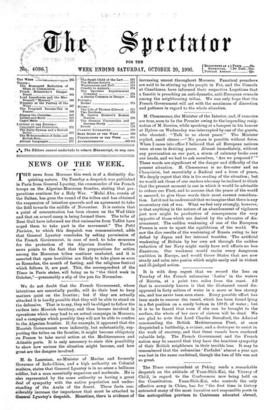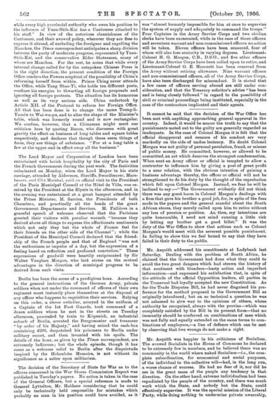The Times correspondent at Peking sends a remarkable despatch on
the attitude of Yuan-Sliih-Kai, the Viceroy of Chi-li, in regard to the Conferences now being held on the Constitution. Yuan-Shih-Kai, who controls the only effective army in China, has for "the first time in history entrusted many of the most lucrative and responsible posts in the metropolitan province to Cantonese educated abroad,
while every high provincial authority who owes his position to the influence of Yuan-Shill-Kai has a Cantonese attached to his staff." In view of the notorious clannishness of the Cantonese, and their avowed policy, wherever they are free to express it abroad, of excluding the foreigner and expelling the Manchus, the Times correspondent anticipates a sharp division between the party of moderate progress, represented by Yuan- Shili-Kai, and the conservative Elder Statesmen, many of whom are Manchus. For the rest, he notes that while every internal change called for by the outspoken Chinese Press is in the right direction, the present condition of the Foreign Office renders the Powers sceptical of the possibility of China's 'reforming herself from within. Prince Ching never attends the Office, while Tang Shao-Yi, who holds ten different poste, confines his energies to thwarting all foreign proposals and ignoring all foreign protests. The situation has its humorous as well as its very serious side. China undertook by Article XII. of the Protocol to reform her Foreign Office. All that has been done is to change the name Tsung-li- Tamen to Wai-wu-pu, and to alter the shape of the Minister's table, which was formerly round and is now rectangular. We confess, however, that a Chinaman might meet our criticism here by quoting Bacon, who discusses with great gravity the effect on business of long tables and square tables respectively, and declares that though these seem things of form, they are things of substance. "For at a long table a few at the upper end in effect sway all the business."















































